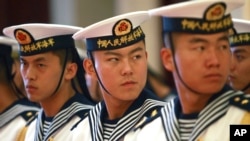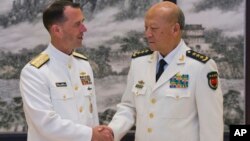After a U.N. court rejected China's claim to vast sections of the South China, the Chinese military is toughening its rhetoric over the disputed region. Analysts say that's a sign that – in contrast to the U.S.’s quiet diplomacy – Beijing is adopting a dual-track strategy in the decades-old, multi-nation conflict.
The U.S. has declined to take sides in the dispute, instead urging countries making conflicting claims to resolve disagreements through diplomacy and avoid confrontation. But the U.S. has also conducted "freedom of navigation" patrols through waters China claims as sovereign, drawing harsh rebukes from Beijing.
During a meeting with U.S. Chief of Naval Operations John Richardson in Beijing this week, Chinese People's Liberation Army Navy Commander Wu Shengli vowed that China is ready to counter aggression in the South China Sea.
He was quoted as saying on CCTV the Chinese navy is prepared to react to any infringement of rights or aggression and efforts to force China to succumb to pressure will be counterproductive.
He added construction around the Spratly Islands will continue, while any decision to build up defense facilities will be pending based on the level of threat.
Meanwhile, China’s air force has confirmed that it conducted a “combat overflight” of the disputed Scarborough Shoal, which would become “routine practice” in the future, while another navy officer warned that any freedom of navigation patrols carried out by foreign navies in the disputed waters would lead to “disaster.”
But Admiral Wu also praised Richardson’s visit, which coincided with China’s launch of another three-day military drill near Hainan Island this week. He said the trip showed both countries understand the need to beef up communication and contain the risk of confrontations.
In a case brought by the Philippines, a court in The Hague last week dismissed Beijing's claim of sovereignty over the nearly 3.5 million-square-kilometers of the South China Sea.
Hard line, soft line
All the tough rhetoric is evidence of China’s continued application of military pressure, said Shao Jianping, an associate professor of international relations from Honghe University, during a seminar on Monday.
But that doesn’t mean that China will cease its diplomatic engagement with Asian neighbors by “playing both a hard and soft line,” in order to maximize the country’s interest in the dispute, he added.
Yet Wu Fei, a professor at Jinan University, disagreed, saying the tough stance represents China’s lack of a clear strategy.
“The reason why China has exhibited a tough gesture is that China is not clear of its own strategy. Neither China nor surrounding countries are sure about the intention of the other parties,” Wu said.
The professor expects China to forge a clear policy as it resumes bilateral talks with neighboring countries.
Domestic considerations
Also, the hard line has a domestic element to it, catering to the rise of nationalism in China for Chinese leaders to consolidate their grip of power, according to another observer.
“On the domestic fronts, [President] Xi Jinping doesn’t want to get the nationalists offsite. His anti-corruption program, his restructuring — China has got a lot of key constituencies within the country. He can’t really afford to get the nationalists offsite,” said Tim Johnston, director of Asia Program at Crisis Group.
The observer argued the fact China didn’t get tougher by announcing an air defense identification zone and the United States didn’t carry out a high-profile freedom of navigation patrol over the past week shows that neither China nor the United States want war in the South China Sea.
Ren Xiao, a professor of international studies at Fudan University, agreed, saying both militaries have established rules to follow to avoid direct clashes in the disputed region, although the chance of miscalculation cannot be ruled out completely.
“A greater risk lies with potential clashes over the air as a result of the pace [of the air force]. But I expect both countries to avoid such a risk,” Ren said.
The Crisis Group’s Johnston viewed last week’s court verdict against Beijing’s nine-dash-line territorial claims as a restart for all the dispute’s claimants to return to a more realistic negotiation although the ruling itself carried a moral dimension, which will give other claimants more weight on their side of table, he said.
All politics and diplomacy is about flexibility and compromises - and the South China Sea dispute is no different, Johnston said.
Allen Ai contributed to this report.






